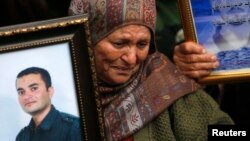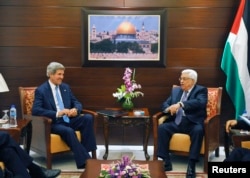JERUSALEM —
Israel has agreed to release a "limited" number of Palestinian prisoners, a day after the two governments agreed to head back to negotiations in hopes of settling long-standing differences.
Israeli government minister Yuval Steinitz made the announcement Saturday, without giving specific details about the number of prisoners or their identities.
Late Friday, U.S. Secretary of State John Kerry announced the plans for resumed negotiations. He spoke in Amman, Jordan, after returning from a trip to Ramallah and a meeting with Palestinian President Mahmoud Abbas.
Kerry said some details are still being worked out but that if all goes well, Palestinians and Israeli officials will travel to Washington for initial talks within the next week or two.
Israel's senior negotiator with the Palestinians, Justice Minister Tzipi Livni, said Saturday that "all issues are on the table" in the planned talks, but she refused to provide details.
Israeli government minister Yuval Steinitz announced earlier Saturday that his country will release a limited number of Palestinian prisoners as a gesture of goodwill. He did not give specifics, but Israel has held some of the Palestinian prisoners for decades.
The Palestinians want an independent state in the West Bank and Gaza Strip, with a capital in East Jerusalem. And they have set as a condition to negotiations that Israel accept the pre-1967 borders, which would expand Palestinian territory.
Media reports Saturday quoted unnamed Palestinian officials as saying Kerry had given President Abbas a guarantee that the negotiations would resume on the basis of Israel's pre-1967 borders. There was no immediate response either from U.S. or Israeli officials.
Peace talks between Israel and the Palestinians collapsed in 2010.
White House officials said President Barack Obama called Israeli Prime Minister Benjamin Netanyahu on Thursday to ask him to work with Kerry to "resume negotiations with the Palestinians as soon as possible."
This past week, in Jordan, Kerry met with representatives of Arab states that support a comprehensive peace plan. He said many of the Arab League ministers told him "the core issue of instability in this region and in many other parts of the world is the Palestinian-Israeli conflict."
Kerry has been urging both Israel and the Palestinians to be cautious and avoid any actions or statements that might undermine their progress.
Kerry has said the proposed plan aims to show both sides the benefits of peace, and, in particular, the impact some proposals could have on the Palestinian economy.
He said programs being considered as part of the plan could reduce unemployment in the Palestinian territory from 21 percent to 8 percent over the next three years while also doubling the Gross Domestic Product.
Some information for this report was provided by AP.
Israeli government minister Yuval Steinitz made the announcement Saturday, without giving specific details about the number of prisoners or their identities.
Late Friday, U.S. Secretary of State John Kerry announced the plans for resumed negotiations. He spoke in Amman, Jordan, after returning from a trip to Ramallah and a meeting with Palestinian President Mahmoud Abbas.
Kerry said some details are still being worked out but that if all goes well, Palestinians and Israeli officials will travel to Washington for initial talks within the next week or two.
Israel's senior negotiator with the Palestinians, Justice Minister Tzipi Livni, said Saturday that "all issues are on the table" in the planned talks, but she refused to provide details.
Israeli government minister Yuval Steinitz announced earlier Saturday that his country will release a limited number of Palestinian prisoners as a gesture of goodwill. He did not give specifics, but Israel has held some of the Palestinian prisoners for decades.
The Palestinians want an independent state in the West Bank and Gaza Strip, with a capital in East Jerusalem. And they have set as a condition to negotiations that Israel accept the pre-1967 borders, which would expand Palestinian territory.
Media reports Saturday quoted unnamed Palestinian officials as saying Kerry had given President Abbas a guarantee that the negotiations would resume on the basis of Israel's pre-1967 borders. There was no immediate response either from U.S. or Israeli officials.
Peace talks between Israel and the Palestinians collapsed in 2010.
White House officials said President Barack Obama called Israeli Prime Minister Benjamin Netanyahu on Thursday to ask him to work with Kerry to "resume negotiations with the Palestinians as soon as possible."
This past week, in Jordan, Kerry met with representatives of Arab states that support a comprehensive peace plan. He said many of the Arab League ministers told him "the core issue of instability in this region and in many other parts of the world is the Palestinian-Israeli conflict."
Kerry has been urging both Israel and the Palestinians to be cautious and avoid any actions or statements that might undermine their progress.
Kerry has said the proposed plan aims to show both sides the benefits of peace, and, in particular, the impact some proposals could have on the Palestinian economy.
He said programs being considered as part of the plan could reduce unemployment in the Palestinian territory from 21 percent to 8 percent over the next three years while also doubling the Gross Domestic Product.
Some information for this report was provided by AP.





